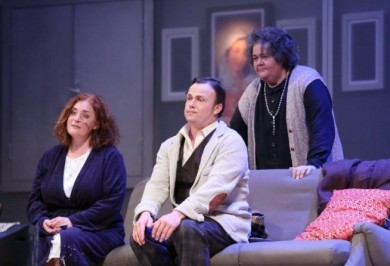Synopsis
Setting: a Moravian village in the nineteenth century
The plot depends on a tangled set of village relationships. Before the opera begins, the mill-owner Grandmother Buryja’s two sons have both married, fathered children, and died. The children’s mothers have also died, except for Kostelnicka, the younger son’s second wife and Jenufa’s stepmother. Custom dictates that only steva, the elder son’s biological child, will inherit the mill, leaving his half-brother Laca and cousin Jenufa to earn their livings.
Act I
Jenufa, Laca, and Grandmother Buryja wait for steva to return home. Jenufa, in love with steva and secretly pregnant with his child, worries that he may have been forced into the army. Laca, in love with Jenufa, expresses bitterness against his half-brother’s favored position at home. As he complains he plays with a knife and, finding it blunt, gives it to the mill foreman to be sharpened.
The foreman tells the family the news that steva has not been drafted after all, to Jenufa’s relief and Laca’s increased frustration. The others leave, and Jenufa waits by herself to greet steva. He appears with a group of soldiers, extremely drunk and boasting of his prowess with the girls. He calls for music and drags the miserable Jenufa into dancing with him.
Kostelnicka steps into this rowdy scene, silences the musicians and, shocked by steva’s behavior, forbids him to marry Jenufa until he can stay sober for one full year. The soldiers and the family leave steva and Jenufa alone, and she begs him to love her, but he, unaware of her pregnancy, gives her casual answers and leaves.
Laca returns, as bitter as ever. He attempts to goad Jenufa into criticizing steva, but she takes her lover’s side despite everything. Laca rages that steva would never even look at her if it weren’t for her rosy cheeks, then slashes her across the cheek with his knife.
Act II
Months later, it is winter. The baby has been born, but steva has not yet come to visit his child. Jenufa’s face is still disfigured, but she is happy in her love for the baby. While Jenufa sleeps, Kostelnicka summons steva and demands that he take responsibility. He answers that while he will provide money in secret, no one must know the baby is his. His love for Jenufa died when Laca spoiled her beauty, and he is now engaged to marry Karolka, the mayor’s pretty daughter.
Steva leaves, and Laca enters. He still doesn’t know the truth about the baby, and when Kostelnicka tells him, his first reaction is disgust at the thought of taking steva’s child under his wing. Fearful that Jenufa will be left with no one to marry, Kostelnicka hastily lies that the baby is dead. Laca leaves, and Kostelnicka is faced with the necessity of making the lie true. She wraps the baby in a shawl and leaves the house.
Jenufa wakes up and says a prayer for her child’s future, but Kostelnicka, returning, tells her that the baby died while she slept. Laca appears and comforts Jenufa gently, asking that they spend the rest of their lives together. Seeing the tenderness of the couple, Kostelnicka tries to convince herself that she has acted for the best.
Act III
It is now spring, and Laca and Jenufa’s wedding day. All seems right again, except that Kostelnicka is a nervous wreck. Steva and Karolka visit, and a chorus of village girls sings a wedding song. Just then, screams are heard. The body of the baby has been discovered in the mill-stream under the melting ice. Jenufa immediately says that the baby is hers, and in her grief appears guilty of the murder. The village is ready to exact immediate justice against Jenufa, but Kostelnicka calms them and says that the crime is hers. Hearing the whole story, Jenufa forgives her stepmother. The crowd takes Kostelnicka off to jail. Jenufa and Laca are left alone.
 Mariinsky Theatre:
Mariinsky Theatre:  Mariinsky-2 (New Theatre):
Mariinsky-2 (New Theatre):  Mariinsky Concert Hall:
Mariinsky Concert Hall: 

